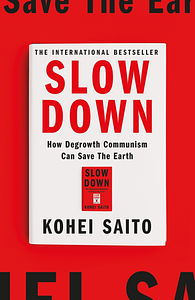Take a photo of a barcode or cover
"No, Sir; I do not believe he studied hard. I never knew a man who studied hard." — Samuel Johnson
On "Serious" thinking
Those who wish to radically re-imagine society are always confronting accusations of "unseriousness" from people who can't imagine the possibility of a world of facts that aren't — narrowly — already the case. What's usually meant by "unseriousness" in this context is the failure to consider so-called "secondary effects" that follow from the implementation of a radical social change. Radicals are rarely in a rhetorical position to reverse this accusation (tu quoque), yet the stock Libertarian response ("the market will solve it") and Communist response ("the community will solve it") are perhaps equally as absurd as the status quo Liberal response ("democracy will solve it"). Samuel Johnson, who was rumoured to have read half of all books ever published in English, denied having ever "studied hard," and "never knew a man who [did]." In the political sense, given the quantity of thought that must go into it, you aren't ever likely to meet someone who isn't "unserious" about politics. Yet "seriousness" is always present, even and especially among those who claim to be "unserious" — it's usually "seriousness" about something else, couched behind what some would call a "revealed preference". Spivak calls this movement, "always squinting around the corner for the [seriousness] that is already with us, at our ease, elsewhere."
Moderation is not a guarantor of "serious" thought. Ontology is already radical — the reality of mass extinction in the setting of anthropogenic climate change suggests the possibility of annihilation of the so-called "human perspective" and all value systems along with it. (This is the view from which art does not exist; the vandalism of climate activists at the Louvre are performance art pieces that permit us to glimpse this.) It's inevitable that any response to climate change will be a bricolage, an impromptu construction that arises from, (in the words of Judith Butler) "taking up the tools where they lie." Great feats of imagination are required. I'm reminded of one of the few adequate academic investigations of the factory farm — Alex Blanchette's Porkopolis, an (unfortunately named) industry case study — in which the so-called "inedible" portions of the industrial pig are made to circulate in disseminated flows of exchange, with the various oppositions to industry subject to regimentation and confrontation on the micro-scale. These are the implements of industrial Capital, yet, as long as we can take them up, such tools might yet be joined to other initiatives — from "lifestyle" consumer choice to "neoliberal" market incentives to "degrowth communism" — is this a "serious" thought.
A writer is almost always more "serious" about his work than the person who reads it on a boat. Every book is a sacrifice, "an unknown quantity of material [time] has been burned in order to produce it." (Calasso, Ruin of Kasch) But a text is often "serious" by "secondary intention" — meaning that it's "serious" about something "around the corner" from the problem it claims to address. Ibram Kendi's admirable How to Be an Antiracist is "serious" about compounding its semantic message with a (hidden) rhetorical effect in a doubling gesture; while Ivan Illich's outmoded Medical Nemesis is more "serious" about Catholicism than anything to do with healthcare. A clue: Everything smooth is deceptive. There's an amusing analysis (credit to Kierkegaard) of that common sermon on the "straight and narrow" path (Matthew 7:13-14), which, by smoothing out the difficulties, ends up presenting two paths of pleasure — one simply more judicious than the other. In other words, the sermon is a failure because it smooths over the place at which it should have stressed the difficulty.
"Degrowth Communism" is hard to do. What's necessary is a cadre of organized partisans willing to lay down their lives to bring global commerce to a halt. What Saitō conveys by the euphemistic phrase, "minor restrictions," (later specified as "[going back to] the lifestyle available in the 1970's,") and the notion of growing fruit trees on city streets, which he calls "radical abundance," is a text that's "serious" about something "around the corner" from the climate crisis. When a writer is very online, we occasionally observe an interesting phenomenon taking place. Disseminated flows of exchange (what Baudrillard would call "circulations of signs") come to supplant semantic meaning in the same way that monetary value supersedes use-value in a capitalist economy. That's another way of saying one can become very "serious" about internet clout. "[Memes] weigh like an Alp on the brains of the living," (Marx, Eighteenth Brumaire), and have their revenge when they are re-incorporated into a book from their origin in the internet soup (i.e. meme as retro-virus). Far be it from me to suggest that such a process is occurring here, but the fact that Saitō is writing so much about student loans (and "East Palestine") in a book about the end of the world perhaps suggests a displacement of "seriousness" away from the topic at hand (
informative
inspiring
fast-paced
challenging
dark
hopeful
informative
inspiring
medium-paced
informative
slow-paced
challenging
hopeful
informative
reflective
slow-paced
challenging
hopeful
informative
inspiring
reflective
medium-paced
challenging
hopeful
informative
inspiring
medium-paced
Completely floored by this book! Saito lays out a Marxist analysis of what the current social structure calls for, as it relates to a restructuring of the status quo. This is a robust manifesto filled with evidence based research to provide context for degrowth. Saito’s evidence is hard to balk at when examining the current economic climate and how economic inequality continues to grow exponentially, despite capitalisms promise to uplift the working class from this. Saito doesn’t just leave with theory either, there are specific tenets toward degrowth, that can and have been implemented across the world, such as democratization of the production process and cooperative management of municipal infrastructure. Change of this current system, economic and social, is a tough lift, but it’s not insurmountable. (ALSO LOVED how the environment was a central piece of this philosophy, we don’t need to spend time ideating on focusing on environmental issues specifically, because everything is an issue relating to sustainability. A ideological shift must occur.)
challenging
informative
inspiring
reflective
fast-paced
challenging
hopeful
informative
inspiring
medium-paced
I think everyone should read this. Chapter 6 alone is worthwhile for its amazing summary of and innovation in traditional Marxist thought, and Saito in general makes a compelling case on many fronts. I am predisposed to agree with whatever conclusions a book like this (Marxist, environmentalist, anticapitalist) might make, but even if one did not have that prior leaning it is still a valuable and convincing read. I also agree that green Keynesianism is an insufficient and laughably inadequate solution to climate crisis, but Saito’s ‘takedown’ of it is a tad sparse and anecdotal (my only criticism of this work). Once he gets into real theory and discursion, the book shines.


